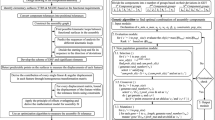Abstract
Quality of a product is based on the quality of the mating parts. When the parts are assembled interchangeably, the assembly variation will be the sum of the component tolerances. If the assembly variation is to be less than the sum of the component tolerances, selective assembly is the only solution. In conventional selective assembly, the corresponding selective groups are assembled. In this paper, selective group combinations for assembling the mating parts is obtained using particle swarm optimization (PSO). The combination obtained has resulted in an appreciable reduction in assembly variation. The proposed algorithm has been demonstrated for a linear assembly, which consists of three components having equal dimensional distributions. The assembly variation obtained by interchangeable assembly is 36 μm. By implementing the proposed method, the assembly variations are reduced from 36 to 7.2 μm. However, this algorithm can be extended for assemblies with more number of components and with different dimensional distributions.
Similar content being viewed by others
References
Allen Pugh G (1986) Partitioning for selective assembly. Proceedings of the 8th annual Conference on Computers and Industrial Engineering, Orlando, FL, USA, March 19–21, vol. 11, no.1–4, pp. 175–179.
Allen Pugh G (1992) Selective assembly with components of dissimilar variance. Comput Ind Eng 23(1–4):487–491 doi:10.1016/0360-8352(92)90167-I
Kern DC (2003) Forecasting manufacturing variation using historical process capability data: Applications for random assembly, selective assembly and serial processing, Ph.D. thesis, Massachusetts Institute of Technology, USA, pp. 135–270
Mease DN, Nair VN, Sudjivnto A (2004) Selective assembly in manufacturing: statistical issues and optimal binning strategies. Technometrices 46(2):165–175
Desmond D, Setty C (1962) Simplification of selective assembly. Int J Prod Res 1(3):3–18 doi:10.1080/00207546108943085
Fang XD, Zhang Y (1995) A new algorithm for minimizing the surplus parts in selective assembly. Comput Ind Eng 28(2):341–350 doi:10.1016/0360-8352(94)00183-N
Kannan SM, Jayabalan V (2001a) A new grou** method for minimizing the surplus parts in selective assembly. Qual Eng 14(1):67–75 doi:10.1081/QEN-100106888
Kannan SM, Jayabalan V (2001b) Selective assembly for minimizing the assembly tolerance in linear assembly. 12th ISME conference, pp.420–425
Kannan SM, Jayabalan V (2001c) A new grou** method to minimize surplus parts in selective assembly for complex assemblies. Int J Prod Res 39(9):1851–1864 doi:10.1080/00207540110035219
Chan KC, Linn RJ (1998) A grou** method for selective assembly of parts of dissimilar distributions. Qual Eng 11(2):221–234 doi:10.1080/08982119808919233
Kulkarni SV, Garg TK (1985) Optimal allocation of tolerances in engineering designs governed by systems of simultaneous tolerance equations using selective assembly. J Inst Eng (India) part ME 5(65):160–168
Mansoor EM (1961) Selective assembly—its analysis and applications. Int J Prod Res 1(1):13–24 doi:10.1080/00207546108943070
Pancholi RK, Swarup KS (2003) Particle swarm optimization for economic dispatch with line flow and voltage constraints [Power generation scheduling], TENCON Conference on Convergent Technologies for Asia-Pacific Region, vol. 1, pp. 450–455
Shi Y, Eberhart R (1998) A modified particle swarm optimizer. Proceedings of the IEEE International Conference on Evolutionary Computation, vol. 4, pp. 69–73
Author information
Authors and Affiliations
Corresponding author
Rights and permissions
About this article
Cite this article
Kannan, S.M., Sivasubramanian, R. & Jayabalan, V. Particle swarm optimization for minimizing assembly variation in selective assembly. Int J Adv Manuf Technol 42, 793–803 (2009). https://doi.org/10.1007/s00170-008-1638-7
Received:
Accepted:
Published:
Issue Date:
DOI: https://doi.org/10.1007/s00170-008-1638-7




